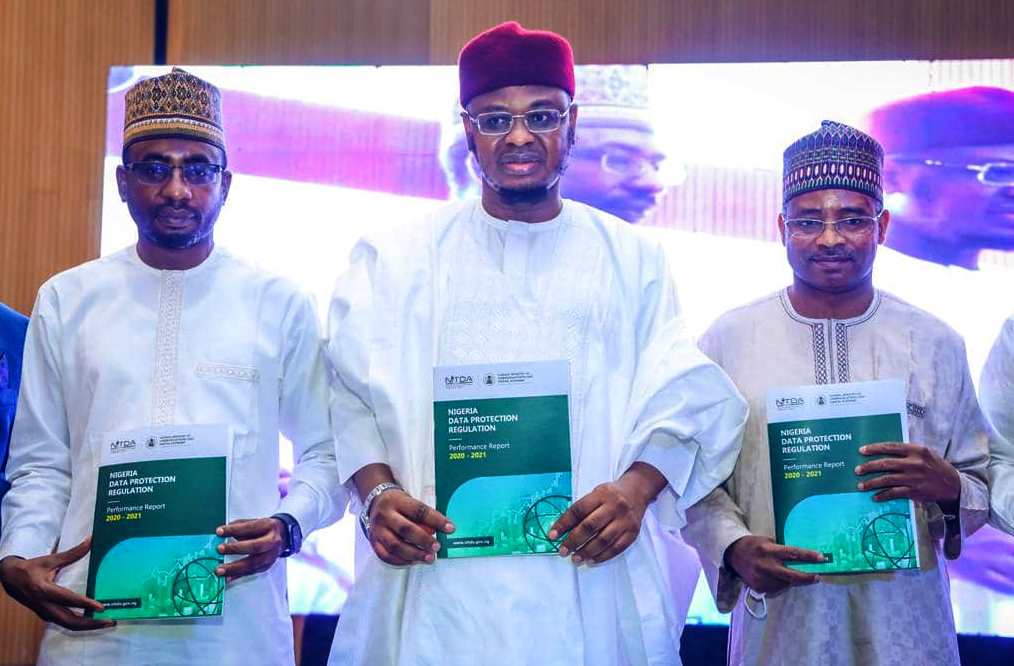By Amaka Joy Onweani
Nigeria’s nascent data protection industry is on the upswing underscored by growing awareness and regulatory assertiveness by the National Information Technology Development Agency (NITDA) to enforce the Nigeria Data Protection Regulation (NDPR) issued in 2019.

The regulator recently unveiled the NDPR Performance Report for 2021 showing a remarkable level of compliance by individuals and corporate entities as the Nigeria’s data protection industry gathers momentum.
RELATED NDPR: Finance Sector Leads As Data Privacy Audit Compliance Rises In Nigeria
Data privacy audit compliance has grown from zero in 2018 to 635 in 2020 and over 1,230 audit compliance in 2021. The new encouraging results were unveiled in Abuja by Minister of Communications and Digital Economy, Prof. Isa Ali Ibrahim Pantami, as part of activities to mark the 2022 World Data Privacy Day.

“This second edition of the NDPR Performance Report is a marked improvement on the first. NITDA is implementing the NDPR in line with the strategic objectives of the National Digital Economy Policy and Strategy (NDEPS). Our objective as government is to issue regulations that catalyse the potentials of Nigerians, not to stifle it. Going by the number of jobs created, the revenue generated for stakeholders and the status of Nigeria in the comity of privacy savvy countries, it can be proudly said that the NDPR has become a national success story,” said Pantami,

He added: “I encourage you as a stakeholder to study the report and give constructive feedbacks that would further improve data protection in Nigeria. I urge you to continue to work with us to build on the success of the NDPR as we hope to have a brand-new legislation on data protection soon. Nigeria’s aim at being the Digital Economy capital of Africa is right on course as we continue to work together to improve on the modest achievements contained in this report.”
The report showed that the Finance sector accounts for 41% of compliance to NDPR. Other top-performing sectors are Consultancy accounting for 9.2%; ICT and Digital Media is 8.8% while Manufacturing accounts for 7.9% compliance.
“What we can glean from the foregoing is a growing level of awareness. More and more, organisations and citizens are becoming conscious of the power of data and the need to regulate data processing in the interest of both individual and national security,” said Director General, NITDA, Kashifu Inuwa Abdullahi.
He added: “When we embarked on the journey of issuing the Nigeria Data Protection Regulation in January 2019, little did we know that we were going on a transformational voyage of immense impact. Our objective was to ensure Nigerians remained competitive in the ever-evolving digital space
“The most successful companies in the world today are behemoths of data. They have not only perfected the art of data collection, but have also perfected the social, psychological and technological uses of such data thereby having immense power to engineer the world for good or otherwise. Europe took the lead in the regulation of personal data. The extraterritorial reach of the General Data Protection Regulation 2016, no doubt catalysed the flurry of new data protection laws and frameworks being issued across the world.”
According to him, since “since NITDA issued the NDPR Performance report 2019-2020, Nigeria has gained more visibility and respect in the data protection and digital economy space. Within the year, we were welcome to the Common Thread Network (a Network of Data Protection Authorities of Commonwealth countries).
“We also got admitted as a full member of the Network of African Data Protection Authorities (NADPA). Our contribution at the Africa Union’s Policy and Regulatory Initiative for Digital Africa (PRIDA) Data Protection Laws’ Harmonisation Work Group led to Nigeria being considered for inclusion on the list of countries where a developed framework for data laws harmonisation was tested.”





























